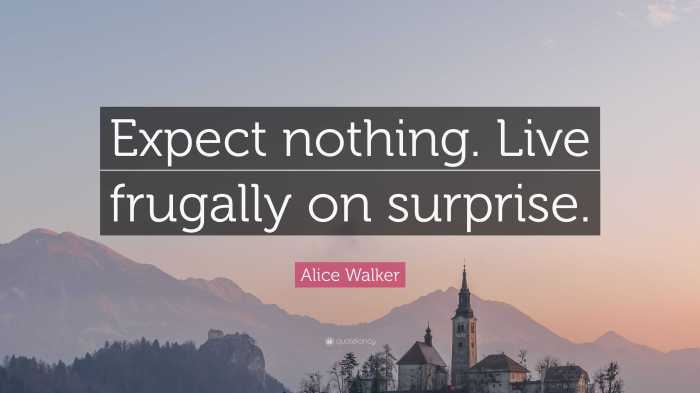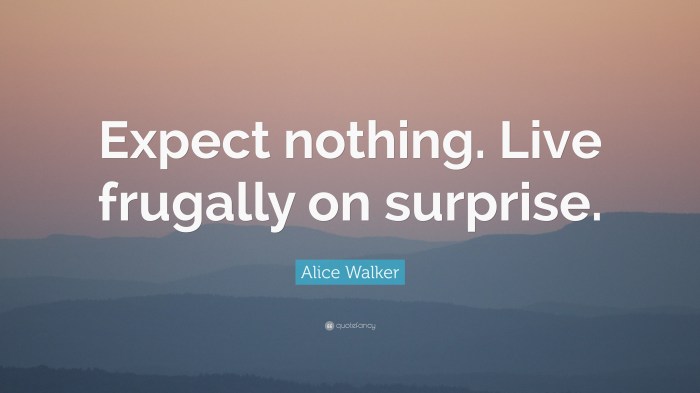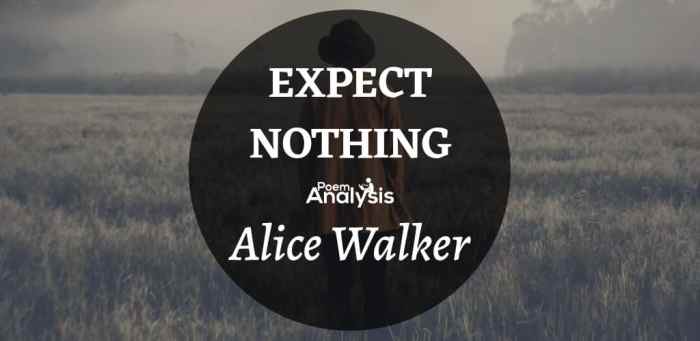Expect nothing by alice walker – In Alice Walker’s profound work, “Expect Nothing,” readers embark on an introspective journey that challenges the expectations that often weigh us down. This transformative concept, when embraced, fosters resilience, liberation, and a newfound sense of personal empowerment.
Through its exploration of interpersonal dynamics, societal implications, and philosophical perspectives, “Expect Nothing” offers a roadmap for navigating the complexities of human relationships, social structures, and the pursuit of inner peace.
Impact on Personal Growth

Embracing “expect nothing” fosters resilience and adaptability by freeing individuals from the burden of expectations. When we let go of preconceived notions and desires, we become more open to unexpected opportunities and less susceptible to disappointment. This fosters a mindset that embraces change and allows for growth in unforeseen directions.
Role of “Expect Nothing” in Promoting Self-Reliance and Personal Responsibility
“Expect nothing” promotes self-reliance by encouraging individuals to take ownership of their actions and outcomes. Without the crutch of external expectations, we are forced to rely on our own abilities and resources. This fosters a sense of personal responsibility and accountability, driving us to take initiative and work towards our goals.
“Expect Nothing” Leading to Liberation and Empowerment
By releasing ourselves from the expectations of others, we gain a sense of liberation and empowerment. We are no longer bound by the constraints of external approval or validation. This allows us to pursue our passions and live our lives authentically, free from the weight of societal pressures or the fear of disappointing others.
Relationship Dynamics

The concept of “expect nothing” can have a profound impact on interpersonal relationships. It challenges the idea that we are entitled to certain outcomes or behaviors from others and encourages us to approach interactions with an open mind.
Healthy Boundaries
Expecting nothing can foster healthy boundaries by preventing us from becoming overly dependent on others or allowing them to take advantage of us. When we have no expectations, we are less likely to feel disappointed or resentful when things don’t go our way.
This allows us to maintain a sense of self-worth and independence.
Codependency, Expect nothing by alice walker
Expecting nothing can also help prevent codependency, a condition in which one person becomes excessively reliant on another. By not expecting anything from others, we avoid creating a situation where we feel responsible for their happiness or well-being. This allows both parties to maintain their individuality and grow as separate people.
Open and Honest Communication
Expecting nothing can promote open and honest communication by reducing the fear of judgment or rejection. When we have no expectations, we are more likely to express our thoughts and feelings without worrying about how they will be received. This creates a safe space for both parties to share their perspectives and build a deeper connection.
In the spirit of Alice Walker’s “Expect Nothing,” we can explore the curious phrase “does the word relish calm dogs” here . Walker’s message of acceptance and self-reliance resonates in this playful question, reminding us that words and their meanings can be as unpredictable as the whims of calm dogs.
Societal Implications

In a society where people “expect nothing,” the potential implications are multifaceted. Such a society would be characterized by a fundamental shift in attitudes and behaviors, leading to significant changes in social dynamics and the distribution of resources.
Reducing Social Inequality
One of the most profound implications of a society where people “expect nothing” is the potential for reducing social inequality. In a society where individuals have high expectations, there is often a tendency for those who do not meet these expectations to fall behind.
This can lead to a cycle of poverty and disadvantage, as individuals who are unable to meet societal expectations may find themselves marginalized and excluded from opportunities for advancement. In contrast, a society where people “expect nothing” would remove this pressure, allowing individuals to pursue their goals without the fear of judgment or failure.
This could create a more equitable distribution of resources, as individuals would be less likely to be held back by societal expectations.
Philosophical and Spiritual Perspectives

The concept of “expect nothing” finds resonance in various philosophical and spiritual traditions. It aligns with the teachings of stoicism, which emphasizes the acceptance of what is beyond our control and the pursuit of inner tranquility. It also echoes the principles of acceptance and non-attachment found in Buddhism and other Eastern philosophies.
Connection to Stoicism
- Stoicism teaches that external events and circumstances are largely beyond our control, and that our happiness and well-being should not be dependent on them.
- By expecting nothing, we liberate ourselves from the potential disappointment and suffering that arise from unmet expectations.
- Instead, stoicism encourages us to focus on what we can control, such as our thoughts, actions, and reactions to events.
Role in Fostering Inner Peace
The practice of “expecting nothing” can contribute to a profound sense of inner peace and contentment. When we release our attachment to outcomes, we become less vulnerable to the ups and downs of life.
- We are less likely to experience disappointment or frustration when things don’t go our way.
- We are better able to appreciate the present moment, without being distracted by hopes or fears about the future.
- We cultivate a sense of equanimity, which allows us to respond to challenges with greater calm and resilience.
Questions and Answers: Expect Nothing By Alice Walker
What is the central message of “Expect Nothing”?
The central message is that by releasing expectations, we foster resilience, liberation, and personal growth.
How does “Expect Nothing” impact interpersonal relationships?
It promotes healthy boundaries, prevents codependency, and fosters open and honest communication.
What are the societal implications of “Expect Nothing”?
It can reduce social inequality, promote a more equitable distribution of resources, and foster a sense of community and shared responsibility.